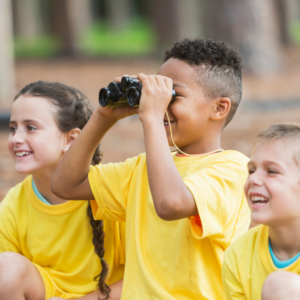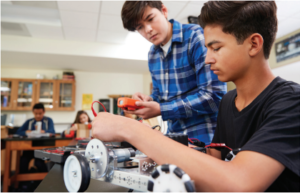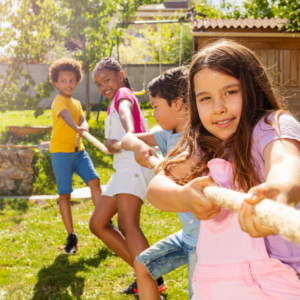Summer Enrichment 2021: Supporting Children’s Social-Emotional Health
By Jessie Tobin, Aaron Leo, & Kristen C. Wilcox
Making Social-Emotional Health a Priority
As we covered in a previous blog, the pandemic has caused detrimental effects on some children’s academic learning, but also has affected the social-emotional development of many youth. While kids may face uncharted challenges as they navigate making up ground in their academics next year, policymakers, researchers, and educators are also recognizing the need to focus on social-emotional health.
This blog discusses frameworks and promising practices with regard to social-emotional learning (SEL) and highlights the value of building and rebuilding peer relationships.
 Core Elements of SEL
Core Elements of SEL
The Collaborative for Academic, Social, and Emotional Learning i.e. CASEL provides a useful framework for SEL focusing on the development of a number of skills including:
- self-awareness,
- self-management,
- decision-making,
- relationship, and
- social awareness
When addressing the myriad of challenges young people have faced in all aspects of their lives throughout the pandemic and the potential for COVID slide through the summer, some researchers are advocating for these aspects of SEL to be prioritized over the summer.
Following suit, SEL has been prioritized in New York State’s American Rescue Plan as SEL opportunities have been associated with enhanced safety, self-worth, and academic efficacy.
Importantly, SEL frameworks and practices are designed to be culturally responsive and sustaining, making them particularly useful in addressing the pandemic-related impacts on the most vulnerable youth and their families.
Building on Youth Voice
Summer is a great time for educators to assess children’s social-emotional health and discover their needs with regard to returning to school in the fall. This can be done through empathy interviews and focus groups or surveys like NYKids offers in our direct school improvement partnerships.
 Taking an equity lens by engaging diverse young people and their families in sharing their concerns through these approaches can help school leaders and educators calibrate needs to actions.
Taking an equity lens by engaging diverse young people and their families in sharing their concerns through these approaches can help school leaders and educators calibrate needs to actions.
Moreover, efforts to include youth voice sends the meta-message that all voices matter in what is prioritized in the school and district.
Prioritizing Peer Relationships
In NYKids’ most recent student study, based on student interviews and focus groups, we found that young people reap a number of social-emotional as well as academic benefits from opportunities to mentor their younger peers, interact with kids from different backgrounds, and connect with alums. As one Malverne student explained,
“With my teacher we learned that you don’t have to be the same identity to know what someone is about or what their identity is. So it’s about having empathy”.
Since the SEL research literature encourages educators to focus attention on fostering healthy relationships among peers, some educators and school leaders are looking to incorporate peer relationship building (and re-building) into summer enrichment programs.
One initiative in the Dalton School District in Georgia, called the Summer Newcomer program, embraced making some unique changes to their enrichment programs last summer. The initial aim of the program was to address the challenges of interrupted learning experienced by many newcomers, specifically unaccompanied immigrant children.
Following COVID guidelines, the Dalton program provided emotional and academic support to students in small group settings.
While younger children experienced museum, playground, and team building activities, high school students were offered additional academic enrichment opportunities in certain subject areas.
 For the 2021 summer, the Dalton School district is planning to increase their reach to students who have been most severely impacted by the pandemic. The expanded aim for this summer is to engage with the most vulnerable students in an environment that focuses on their mental health and social-emotional well-being, with additional academic supports aimed to help those students from feeling isolated and left behind.
For the 2021 summer, the Dalton School district is planning to increase their reach to students who have been most severely impacted by the pandemic. The expanded aim for this summer is to engage with the most vulnerable students in an environment that focuses on their mental health and social-emotional well-being, with additional academic supports aimed to help those students from feeling isolated and left behind.
To read more on SEL practices and the importance of peer relationships, check out our NYKids’ blogs as well as our research results page highlighting our latest student study findings on the value of peer relationships.
Additionally, tune into the 2021 Summer Symposium: Addressing Differential Impacts of COVID-19 In New York State with NYKids’ presentation on June 28th.
You can reach out to us with any comments or questions about our research or to request direct support for planning for reopening in the fall at: nykids@albany.edu
